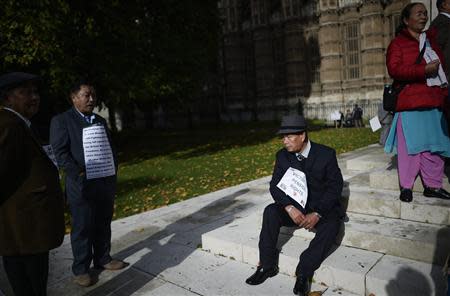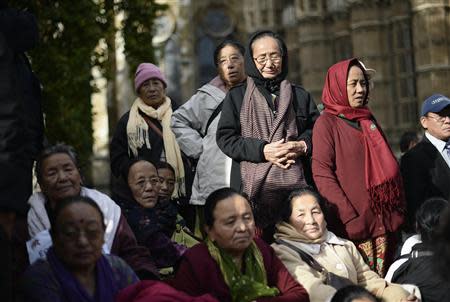Lost generation of elderly Gurkhas struggle in Britain
By Hannah Vinter FARNBOROUGH, England (Reuters) - Retired Captain Birbahadur Thapa served in the British army for 28 years as part of the Brigade of Gurkhas, the fighting force recruited in Nepal whose kukri-wielding soldiers have long been famed as fearsome warriors. Now he leads a less glamorous existence in the run-down southern English town of Farnborough. Thapa, 72, is one of a number of former Gurkhas who were able to move to England after 2009, following a successful campaign spearheaded by actress Joanna Lumley to give all members of the brigade with at least four years service the right to settle in Britain. But almost half a decade after the event, many elderly retired Gurkhas find themselves struggling to adapt. "Our people, who have come here to settle, especially old people, they haven't got any relatives, they haven't got anybody, life is so tough for them," Thapa said. An estimated 10,000 ex-Gurkha heads of family live in Britain, having come here after serving in the famous brigade that since 1815 has fought in numerous conflicts, from Gallipoli to Malaya to the current war in Afghanistan. But though they have been part of the British army, many older ex-Gurkhas do not speak good English and find navigating life in the country a challenge. "The elderly people who come here in particular find it very difficult to integrate because they don't speak the language, they don't understand the system," said William Shuttlewood, director of the Gurkha Welfare Trust charity. The veterans' situation has helped fuel protests by a group of ex-Gurkhas, their families and supporters, who are calling for improvements to their pensions and other benefits. After a series of 24-hour fasts by demonstrators, protest organiser Gyanraj Rai on Thursday began an all-out hunger strike to push for their demands, which start with equal pension payments for Gurkha soldiers compared to their counterparts in other parts of the British army. Currently, many Gurkhas draw pensions tied to the cost of living in Nepal. Others only see around a third of their service prior to 1997 counted as pensionable, meaning they also receive lower monthly pay-outs than British equivalents. But the Ministry of Defence said the Gurkhas' pension arrangements are fair, having withstood three judicial reviews over the last decade, and that Gurkhas have benefitted from being able to receive pensions at an earlier age than their British counterparts. "LOST SOULS" For the younger ex-Gurkhas who have come to Britain and are still at working age, adapting is not nearly so much of a challenge. Many speak good English, and are able to start businesses or find jobs, frequently as private security guards. Muchhetra Gurung, a 49-year-old who served with the Gurkhas for 17 years before retiring in 1999, is the director of a travel agent in Aldershot, an old army town where many of the veterans have settled. "We know the system, we have no problem here," he said of the younger generation in Britain. Life is different for the elderly, he said, many of whom would rather go back to Nepal if they had better pensions which would afford them a good quality of life there. Though some older retired Gurkhas might struggle to adapt, they have an incentive to come to Britain. They are entitled to the same benefits as the country's citizens, including housing benefit, pension credits and access to the National Health Service, which they would not receive in Nepal. The protesters say it would be cheaper for the government to pay an equal army pension that would allow elderly veterans to enjoy a high standard of living in their home country, rather than drawing them to Britain where they cost the government more through the benefit system. This argument is shared by the head of the British Gurkha Welfare Society (BGWS), a group which is bringing a case calling for equal Gurkha pensions to the European Court of Human Rights. The chairman of the organisation, retired Major Tikendra Dal Dewan, said currently many of the elderly Gurkhas feel stranded. "This older generation that come here, sadly some of them have come directly from the villages and they have not even seen a gas cooker, it's that extreme," he said. "If you just take a ride round Aldershot, you can see so many Gurkhas just walking around like lost souls." By contrast, retired Gurkhas have traditionally been revered figures on returning to their homes in Nepal, where they are supported by social and family networks. Gurkha protesters say that current pensions do not stretch far enough in Nepal, but charity director Shuttlewood contends that they can provide a "very good standard of living" there. Retired Gurkha Lieutenant Bhim Prashad Gurung, who lives in Nepal, disagrees. He receives a pension of around £350 a month, which he says would not be enough without extra income that he makes from a rice field. "In Nepal it is not a lot of money, but it is just surviving you know," he said. (Reporting By Hannah Vinter; Editing by Angus MacSwan)










